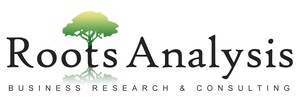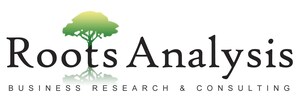The Cell and Advanced Therapies Supply Chain Management Market is Anticipated to Grow at an Annualized Rate of 11% till 2030, Claims Roots Analysis
Over time, biopharmaceutical companies have realized the importance of integrating advanced software into the cell and advanced therapies supply chain. Such upgrades have demonstrated the ability to offer both time and cost saving
LONDON, Nov. 19, 2019 /PRNewswire/ -- Roots Analysis has announced the addition of the "Cell and Advanced Therapies Supply Chain Management Market: Focus on Technological Solutions (Cell Orchestration Platforms, Enterprise Manufacturing Systems, Inventory Management Systems, Laboratory Information Management Systems, Logistics Management Systems, Patient Management Systems, Quality Management Systems, Tracking & Tracing Systems, and Other Software), 2019-2030" report to its list of offerings.
The cell and advanced therapies supply chain is complex, with several legacy challenges, such as those related to patient scheduling, resource planning, inventory management, and deliverable tracking. A number of innovative, software-enabled systems are available / under development to mitigate the aforementioned concerns and simplify the management of biopharmaceutical supply chains.
To order this 420+ page report, which features 150+ figures and 350+ tables, please visit this link
Key Market Insights
Over 160 software-enabled supply chain management systems are currently available
Of these, more than 25% are inventory management systems (IMS), which are primarily used for tracking inventory, orders, sales and deliveries. Examples include (in alphabetical order) ATiM Software, Benchling Inventory, CryoTrackIMS, Cryotrax, CTM-STAR™, Lynx Mobile®, Mosaic FreezerManagement, and Stafa Apheresis.
~80% of marketed solutions are used in collection centers and sample storage warehouses Further, about 49% of such systems are being implemented to streamline manufacturing operations of cell and advanced therapies.
Cloud-based deployment is gradually gaining popularity
Stakeholders claim that such deployment methods can be rapidly provisioned with minimal management effort (often over the internet), allowing for faster implementation. At present, about 47% of the software systems are being deployed via cloud; examples include (in alphabetical order) Chronicle™ automation software, Cryoportal®, evo.is®, PAS-X MES, STARLIMS, tempmate®-CLOUD, and TrakCel™.
Around 57% of the stakeholders in this industry are based in the US
This can be attributed to the increasing interest in cell and advanced therapies in this region, making North America the current hub of innovation in this field. It is followed by players in the EU (35%) and Asia Pacific (8%).
2,600+ tweets focused on the increasing interest and ongoing efforts of industry stakeholders
Social media analysis revealed that many biopharmaceutical developers are adopting software-enabled supply chain management solutions with increasing enthusiasm. In fact, many of the tweets were related to the ability of such systems to resolve the challenges associated with large volumes of supply chain data.
Over 10 supply chain orchestration solutions are currently available in the market
These solutions have demonstrated the ability to efficiently integrate core software systems, in order to offer needle-to-needle traceability within complex supply chains.
~USD 650 million has been invested by both private and public investors, since 2014
Of this, close to USD 300 million was raised through venture capital funding rounds, representing 47% of the total capital raised. Further, there were five instances of IPOs / secondary offerings, accounting for USD 280 million in raised capital.
Partnership activity has increased at an annualized rate of 14%
In fact, around 55% of the reported deals were established post 2016; the maximum partnership activity was observed in 2018. Majority of these agreements (75+) were observed to be focused on platform integration or the establishment of service alliances.
North America and Europe are anticipated to capture over 85% market share by 2030
In addition to North America and Europe, the market in China / broader Asia Pacific region is also anticipated to grow at a relatively faster rate.
To request a sample copy / brochure of this report, please visit this link
Key Questions Answered
- What are the trending software solutions for the management of cell and advanced therapies supply chain?
- Who are the leading industry and non-industry players in this domain?
- What are the key challenges faced by various stakeholders in this domain?
- What kind of partnership models are commonly adopted by stakeholders in this industry?
- Who are the key investors in this field?
- What is the current and likely future cost saving opportunities associated with supply chain management solutions?
- How is the current and future market opportunity likely to be distributed across key market segments and geographies?
- What factors are likely to influence the evolution of this upcoming market?
The financial opportunity within the cell and advanced therapies supply chain management market has been analyzed across the following segments:
- Application area
- Donor eligibility assessment
- Sample collection
- Manufacturing
- Logistics
- Patient verification and treatment follow-up
- Type of software solution
- Cell orchestration platform
- Enterprise manufacturing system
- Inventory management system
- Laboratory information management system
- Logistics management system
- Patient management system
- Quality management system
- Tracking and tracing system
- Mode of Deployment
- Cloud-based solution
- On-premises solution
- End user
- Biobank
- Cell therapy lab
- Hospital
- Research institute
- Commercial organization
- Key geographical regions
- North America
- Europe
- Asia Pacific
The report features inputs from eminent industry stakeholders, according to whom software-enabled supply chain management systems have the potential to eliminating risks, and reducing time and capital investment in the cell and advanced therapy development process. The report includes detailed transcripts of discussions held with the following experts:
- Martin Lamb (Chief Business Officer, TrakCel)
- Jacqueline Barry (Chief Clinical Officer, Cell and Gene Therapy Catapult)
- Bryan Poltilove (Vice President and General Manager, Thermo Fisher Scientific)
- Divya Iyer (Senior Director, Corporate Strategy and Business Development, McKesson) and Jill Maddux (Director, Cell and Gene Therapy Product Strategy, McKesson)
The research includes elaborate profiles of key stakeholders (listed below), featuring a brief company overview, its financial information (if available), and a detailed description of its platform(s), recent developments and an informed future outlook.
- Be The Match BioTherapies®
- Brooks Life Sciences
- Clarkston Consulting
- Cryoport
- Haemonetics
- Hypertrust Patient Data Care
- Lykan Bioscience
- MAK-SYSTEM
- MasterControl
- SAP
- SAVSU Technologies
- sedApta Group
- Stafa Cellular Therapy
- Title21 Health Solutions
- TraceLink
- TrakCel
- Vineti
For additional details, please visit
https://www.rootsanalysis.com/reports/view_document/cell-therapies-supply-chain/260.html or email [email protected]
You may also be interested in the following titles:
2. Global T-Cell (CAR-T, TCR, and TIL) Therapy Market (4th Edition), 2019 – 2030
3. Stem Cell Therapy Contract Manufacturing Market, 2019-2030
4. Cell Encapsulation: Focus on Therapeutics and Technologies, 2019-2030
5. Cell and Gene Therapy CROs Market, 2018-2030
Contact:
Gaurav Chaudhary
+1(415)-800-3415
[email protected]
SOURCE Roots Analysis

WANT YOUR COMPANY'S NEWS FEATURED ON PRNEWSWIRE.COM?
Newsrooms &
Influencers
Digital Media
Outlets
Journalists
Opted In






Share this article